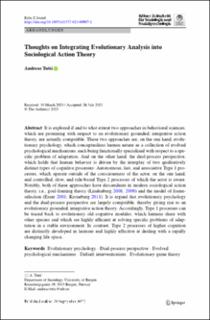| dc.description.abstract | It is explored if and to what extent two approaches in behavioral sciences, which are promising with respect to an evolutionary grounded, integrative action theory, are actually compatible. These two approaches are, on the one hand, evolutionary psychology, which conceptualizes human nature as a collection of evolved psychological mechanisms, each being functionally specialized with respect to a specific problem of adaptation. And on the other hand, the dual-process perspective, which holds that human behavior is driven by the interplay of two qualitatively distinct types of cognitive processes: Autonomous, fast, and associative Type 1 processes, which operate outside of the consciousness of the actor, on the one hand, and controlled, slow, and rule-based Type 2 processes of which the actor is aware. Notably, both of these approaches have descendants in modern sociological action theory, i.e., goal-framing theory (Lindenberg 2008, 2009) and the model of frame-selection (Esser 2001; Kroneberg 2011). It is argued that evolutionary psychology and the dual-process perspective are largely compatible, thereby giving rise to an evolutionary grounded, integrative action theory. Accordingly, Type 1 processes can be traced back to evolutionary old cognitive modules, which humans share with other species and which are highly efficient at solving specific problems of adaptation in a stable environment. In contrast, Type 2 processes of higher cognition are distinctly developed in humans and highly effective at dealing with a rapidly changing life space. | en_US |

